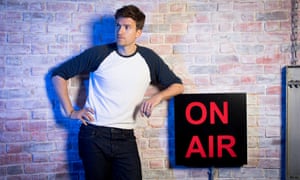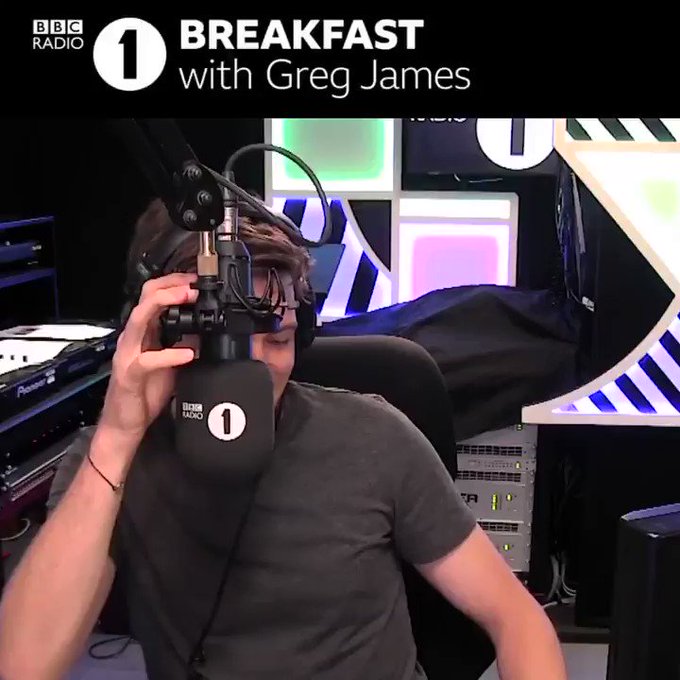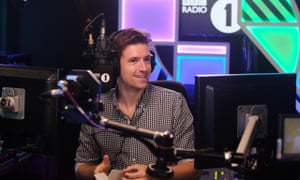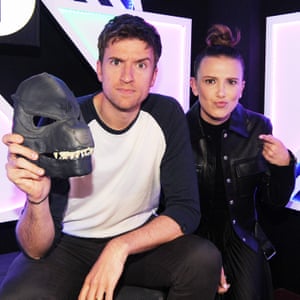Interview
‘We all have to be laughing by 5.30am’: how Radio 1’s Greg James saved Breakfast
The BBC Radio 1 Breakfast show, says its host, Greg James, is about “fun for fun’s sake”. This Wednesday morning, not long after dawn, that involves a lot of chat about bins. There are a couple of stories knocking about, James explains on air. A Nuneaton family accused of having smelly bins have defended themselves on TV. A binman has bought a birthday cake for a woman on his route who was turning 100. Plus, it is James’s bin day today. “And yes, I did remember to put them out before I came in.”
James’s day starts at 5.30am, four days a week, with his show on air from 6.30am to 10am. As I listen at home, getting ready to join him in the studio for his final hour, it occurs to me: sometimes it is not enough just to go out in search of fun, it is more often about making your own – and hoping it translates.
“Our rule is that we all have to be laughing at half five, if possible,” James says later, in a BBC boardroom after the show. “Even if it’s just doing a stupid impression, or saying a filthy joke or doing a dance – we have to be in that mindset of: ‘It’s shit o’clock in the morning, but all of the people listening are having much less fun.’”
Privately, I struggle to think of anything worse than riffing before 7am – but it is working for James. The announcement last year that he would be taking over from Nick Grimshaw on Breakfast was not met with surprise. James had been in the mix to replace Chris Moyles in September 2012, but had lost out to “Grimmy”, thought to be the man to bring in the coveted “youth audience”.
He did, according to metrics such as YouTube views and social engagement – but struggled on broadcast, with Breakfast slumping from a weekly audience of 7 million people aged over 10 to record lows of about 5 million during Grimshaw’s five-year run. James, who took over a year ago today, was a relative everyman: handsome, capable, the type of man who sincerely says: “It’s nice to be nice,” and is, right now, wearing bright pink socks with bananas on them. When I had asked a friend at the Beeb for internal intel, the best he could come up with was that James was a “lovely man”.
It is not necessarily what you would imagine turning the dial for – but people have done, in droves. When we speak, the week before James’s anniversary, the latest Rajar audience figures show that he has attracted 250,000 new listeners in his first year.
It is a rare success story in radio, with Zoe Ball’s Radio 2 Breakfast show – the country’s most popular – losing 780,000 listeners since January to record an audience of 8.27 million in the second quarter of 2019. James’s show has a weekly audience of 5.69 million listeners aged 10-plus, up from 5.44 million last August. Presumably, everyone is very happy with him? “I knew it was good when I heard from every single big BBC boss on Rajar day.”
Had he really had no idea that the show had been a success before then? “We felt it,” says James, cautiously. “We felt like it’s been a really successful year. We attacked the show, the brief of the show, with confidence.” The kind of confidence that led them to propose, just weeks after taking over, a nationwide endeavour to get a Cornish pasty to a listener in Scotland, who said she had never had one. Handed between listeners like an Olympic torch, the pasty reached her after 19 stops, travelling 674 miles in four days.
.@gregjames is sending a pasty from Cornwall to listener Sarah in Aberdeenshire, who has never had a pasty before! And we want the help of YOU our wonderful listeners. If you’re near the pasty and can help it on its journey, then please get in touch to help us out #PassThePasty
His bosses were initially sceptical of the “Pass the Pasty” idea, says James, but were won over by his conviction, his team’s experience, and the health and safety documents they assembled. “You don’t ever say: ‘This is going to be the best thing in the whole world.’ You go: ‘We’re trying to get a pasty from Cornwall to Aberdeenshire. Are you on board?’”
It was a huge hit with listeners and followed up with more – in James’s words – deeply stupid stunts. The highest-profile moments of his year on Breakfast have included roping in listeners to break him out of an escape room (it took 30 hours) and, last month, a nationwide game of hide-and-seek with Grimshaw (they were eventually found in Weston-super-Mare).
The other thing my BBC friend had told me, beyond his unhelpful “lovely man” remark, was that Breakfast was bucking the trend in BBC Radio in that it was having money spent on it; James concedes this. “They don’t say no now,” he says, a bit wonderingly. “There will be a fall at some point – we’ll mess one up. And that’s fine!” In fact, the stunts are now held up internally as a benchmark of broadcasting success, says James, somewhat incredulously. He adopts the same stuffy, officious voice with which he gently ribs his employer on air: “‘We need another Pass the Pasty!’”
I can’t tell if James is being unnecessarily self-effacing when he says he had “had an inkling” that he would be taking over from Grimshaw when he was asked to put together a pitch for his hypothetical Breakfast show. But, after six years on Drivetime, he says he “desperately needed a new challenge”. When he sat down to think about what he would do, and his favourite on-air moments – including sofa-surfing his way from London to T in the Park near Kinross in 2013 – the consistent thread was listeners.
When, early last year, his gruelling “Gregathlon” fundraiser for Sport Relief – scaling three peaks and cycling 500 miles in five days – was derailed by wild weather, he spoke emotionally on Drivetime about the impact it had had on his mental health. It sparked “unbelievable conversations” with listeners about their own experience of depression, unemployment and postnatal depression. In his first-ever hour on Breakfast, he said he wanted it to be a “safe place for people to confess things and be weird”.
Since then, he has regularly spoken on air about mental health, and his own experience of anxiety; he continues to see a therapist every few months. He credits his wife, the writer (and former Guardian journalist) Bella Mackie, with helping to build his empathy and confidence. “I can’t stand up and be an advocate for people, particularly men, talking about their brains if I’m not willing to be open about how I am every now and then. It’s about meeting listeners halfway.”
After one year, James’s characterisation of himself as their “ringleader” rings true. It is a big jump from the A-list access of Grimshaw’s years. Whereas Grimmy might have had Kate Moss or (more likely) Rita Ora on line one, on the morning we meet James has spoken to Hannah, a teacher mortified that her class didn’t get the reference she made to Steps in her lesson on tragedy.
Before he took over Breakfast, he says, he had had an “epiphany” that there was no way that he – or any celebrity with a rubbish book to plug – could be more interesting, funny or relevant than the audience. This might seem glib, a tokenistic nod to those who pay the licence fee (James’s salary is between £225,000 and £229,999), but the proof is in the programme, which is substantively listener-led.
James often makes it explicit, I note, saying on air: “This show is for you.” He considers that thoughtfully. “I suppose it’s sort of cynical in a way, in that you want people to know that – but that is also a True Thing …” When he asks them to talk to him – this morning, about what they do when they’re bored at work – they do so in droves.
It’s not always especially starry or high-octane, but it’s human, and surprisingly compelling – creating the sense that we are all in this together. James says he works hard to make the show inclusive, prioritising women’s voices and rejecting an early jingle for being “too laddy”. “I’m a white bloke doing a breakfast show in 2019. You should just naturally be mindful that that is what you are. You don’t want it to ever be a boys’ club.” Radio has been in the past, though – and British popular culture generally. “Yes, it has. And it was something that I never particularly enjoyed.”
James marvels at Yorkie bar’s former tagline “Not For Girls”: “Weirdly recent, that! Nuts magazine, and Max Power – all those things were around when I was a teenager and definitely conditioned me to think that that was fine.” As many generations did, he adds. But – as a cricket fan (he co-hosts Radio 5 Live’s cricket podcast, Tailenders), a drama graduate and someone who was “never cool at school” – James says he feels as if he can “float around a little bit”. “I’m not naturally ‘stag do’ … You distil it and go: what are the nice bits of that? There’s camaraderie, there are in-jokes, there are silly catchphrases. And those things, we’ve added into the show.”
That inclusive spirit extends to age. Although Radio 1 is considered (at least by Radio 1) “the most important platform for youth culture in the UK”, for 34-year-old James, the age of his audience is less important than a shared sensibility: an interest in “silly, fun topical stuff”.
He scoffs at the statistic I pull up from Enders Analysis, stating that around 840,000 15- to 24-year-olds have turned off radio for good since 2010. “For good!” What about this one, then, that 75% of children surveyed want to be YouTubers and vloggers when they grow up? It’s very different from being a radio presenter, James agrees – adding, rather devastatingly, that many YouTubers find that out “when their four or five years come to an end” and they have to assess their transferable skills. The best radio presenters are passionate about that medium, he says. “If you don’t love it, you can instantly tell that they’re not really there. It just feels like they don’t know what they’re doing.” The podcast boom is helping to keep audio essential, “and that’s a brilliant thing for everyone – but there are a lot of bad podcasts”.
The world may have moved on, says James, but he is confident in the next generation of radio presenters. “It’s not as if everyone wanted to be a radio presenter in the 80s. You could just substitute ‘YouTuber’ for: ‘I want to be famous.’” Was that his motivation? “Never. I wanted to be well known for being funny.” And he loved radio, in a deeply uncool, anoraky way. He pokes fun at the press cliche of presenters having recorded jingles in their childhood bedrooms – but he really did.
James’s parents, Rosemary and Alan, were both teachers, and mostly happy to leave him to his interests: “Whether it was squirrelling away upstairs recording radio shows, or pretending to revise, or going to play cricket, or whatever. They were happy to leave me alone: ‘Go out and get drunk, but don’t be an idiot.’” A few years ago, James and his older sister clubbed together to pay off their mum and dad’s mortgage. They still tune in at 6.30am every morning, he says, “to check I turned up”.
Although it was Terry Wogan he was “obsessed” with, he gets misty-eyed about being driven to school by his mum, listening to Chris Evans “being mad” on Virgin 1215: “Alanis Morissette’s Ironic automatically takes me back to being that age.”
These days, though, media is so fragmented – I wonder if you can ever assume that everyone is listening to any one song, except Lil Nas X, on repeat, for ever? “I do believe this, but I also have to believe this: you can get new people listening to radio. And that’s what we’ve proven, to a certain extent, so far.”
Extending jokes from Monday’s show into Tuesday, and regular segments such as Yesterday’s Quiz and the Ten Minute Takeover reward returning listeners. James calls those “the basics”, just classic radio tricks that weren’t put front and centre on Radio 1 as they should have been for a few years.”If he’s a touch dismissive, I locate it in the same high standards, informed by years of wonkery; he describes himself as critical, cynical, strategic and quite possibly a workaholic. “I’m doing the best radio shows I’ve ever done, and I’m getting better every single week, I think. I’m learning and I’m practising and I’m trying stuff out.” In May, he made his Radio 4 debut with a series called Rewinder, presenting a Radio 1-style smörgåsbord of the BBC’s newly digitised archive. It was a bid – backed by Radio 4 bosses – to shake up the station a little bit, says James: “I didn’t know what the reaction would be, but I am respectful of it. I didn’t want to go on there and start doing ridiculous phone-ins – you do have to change your act.”
Although James says Rewinder was a success, not every new voice is embraced on Radio 4. When we speak, the Desert Island Discs presenter Lauren Laverne has just been accused by the Spectator of embodying the “cultural problem at the BBC” where standards are allowed to drop in the drive for younger listeners. The columnist Melanie McDonagh said Laverne was “lightweight and uncerebral”, a poor interviewer, and too nice to make compelling radio. “I think that article was needlessly nasty,” says James. “Lauren is wonderful. She’s overqualified and has done a brilliant job. I thought that whole thing was a bit clickbaity.”
He says he has no aspiration to host a particular show on the BBC (perhaps just as well, given the complaint over Laverne: he says he would throw out the Bible and the complete works of Shakespeare were he to host Desert Island Discs), nor does he want to try TV or be any more of a celebrity: “I’m really proud not to be tabloid fodder.” He writes the children’s book series Kid Normal, with the newsreader Chris Smith, and is working on two sitcom ideas: one about a group of people who try to complete their dead friend’s bucket list (a completed pilot, written with the comedians John Kearns and Pat Cahill, whom he went to university with); and another about a community cricket team.
For now, the only goal that comes to mind is to be a guest on I’m Sorry I Haven’t a Clue (“Put that in!”) and to continue to build on his wins at Breakfast. James says he is pushing himself to improve every week. “There will probably be a shit Rajar at some point, but I will deal with that as I did the good one, which is: ‘OK, cool, keep going.’ That’s not going to be the marker of success for me. To be candid about it, it gives us another three months where everyone leaves us alone.”
James is clearly uncompromising about quality, while creating a show that feels like an escape from reality, a welcome injection of silliness. He does makes the odd stand, calling the men who told YouGov they would score a point off Serena Williams “pricks” on Twitter and chiding those who said that the rapper Dave’s song Black was racist against white people. James told them “to go and read up and educate yourself a bit”. He is optimistic about people’s ability to change their minds, grow, “be better” – and Breakfast, “with its mainstream audience of people who are not ignorant on purpose”, plays a part.
The show can’t ignore Brexit, Boris Johnson and Donald Trump – but the BBC’s impartiality clause is a restriction. In these desperate, often dire times, does fishing for fun in rubbish bins ever feel like an uphill battle – or even appropriate? “I flip between two thoughts on this: sometimes it does feel like you’re really pushing against dread and toxicity and a world full of charlatans and fraudsters and madness …” His tone brightens. “But the flip side of that is: isn’t it such a great time to be silly?







